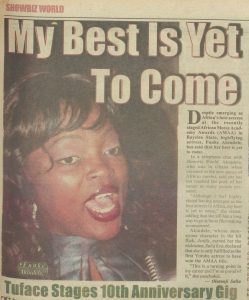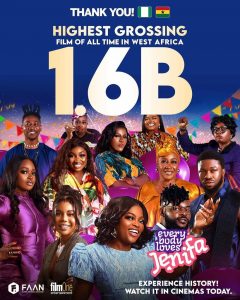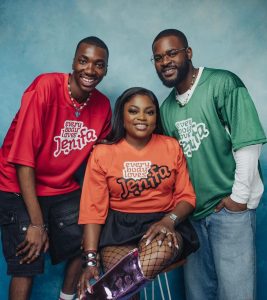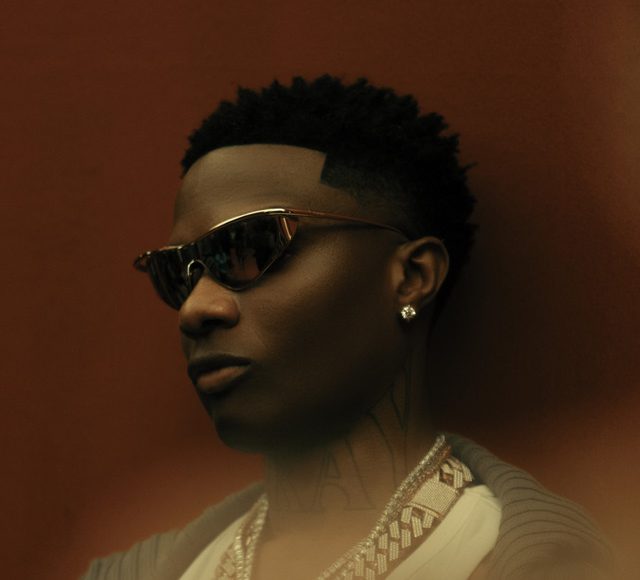
Movie Review: ‘Everybody Loves Jenifa’ Leaves Fans Laughing but Wanting More

As I stepped into Genesis Cinemas in Port Harcourt, it was clear that I wasn’t alone in my excitement to see Everybody Loves Jenifa. The waiting area buzzed with anticipation, packed with fans whose energies were electric. This wasn’t just another Nollywood film; it felt like a cultural event. Funke Akindele, the brilliant mind and star behind Jenifa, had once again captured the hearts of the audience. Conversations about the beloved character filled the air, a testament to how deeply Jenifa has become embedded in our lives over the years.
Funke Akindele is one of the most important faces in Nollywood, with a host of roles that have struck a chord with the audience. However, none has reached the iconic status of Jenifa. First introduced in the 2008 film Jenifa, the character’s broken English, wacky style, kind heart, and comedic timing made her an instant hit. The sequel series, Jenifa’s Diary, further cemented her status as a cultural icon. It has been quite captivating to watch Jenifa grow from a naive village girl to a modern-day advocate, and Everybody Loves Jenifa tries to bring that into the big screen.
In a 2009 interview with P.M. News, Akindele said, “My best is yet to come.” Well, that prediction came to pass. Everybody Loves Jenifa has grossed over N1 billion at the box office, making it one of Nigeria’s highest-grossing films. That means Akindele has directed four of Nigeria’s highest-grossing films: A Tribe Called Judah, Everybody Loves Jenifa, Battle on Buka Street, and Omo Ghetto: The Saga.


The film opens with a dramatic rescue in Amen Estate: Jenifa saves a child from fire and is instantly admired in the community. This tense, heroic scene shows her potential to be a figure of influence. While retaining humour, confidence, and energy, her now more statuesque stature within the community means her way of speaking-though still charming, is more readily accepted by her community. However, this potential is explored only briefly in the film.
The film boasts returning and new talents, with Omowunmi Dada infusing a lot of depth through her portrayal of Mimi, Jenifa’s loyal confidante. The overbearing matriarch, Mrs. Agnes, is played so well by Patience Ozokwor, who, though present in the scenes, feels slightly underdeveloped in character. Nancy Ismie’s character—Olivia’s personal struggles make for some very good social issues. Jenifa gets to champion her justice and, of course, women’s rights through her now-trademark inalienable yet soft advocate.
Stan Nze plays Mr. Lobster, a philanthropist whose work starts to overshadow Jenifa’s projects, creating a competitive dynamic that forces her to re-evaluate her approach to activism. Destiny Etiko’s Angel introduces intrigue through her morally ambiguous involvement with Mr. Lobster. Bisola Aiyeola’s Madam Bassey, leader of a women’s rights NGO, emphasises themes of collaboration and empowerment.
Less fortunate, Chimezie Imo is a drug courier in Ghana, a subplot that does not feel like part of the story. Then there is Lateef Adedimeji, who plays a local gang leader in Ayetoro to minimal effect. In contrast, Jackie Appiah and Tope Tedela make for a menacing team as the heads of a cartel, introducing drama into the tension.
The movie also boasts of old faces in Jenifa’s Hair Salon. Omotunde Adebowale-David reprises as Adaku, whose plot point-exodus to Ghana was never resolved. Paschaline Alex gives an excellent performance as the mature Cordelia. Tobi Makinde plays Timini, who is ever loyal, but his character is too underdeveloped. Michael Uba makes a fleeting appearance as James; again, his comic talents are underutilised.

Rex, interpreted by Layi Wasabi, adds comic relief and a considerable screen presence that lifts the film. His performance is undoubtedly one of the most unforgettable in the movie. Juliana Olayode’s Toyosi, Jenifa’s trusted friend, is also back on a nostalgic note but turns to drug trafficking, introducing heavy emotions into the movie. However, her motive for such a decision is well known, but her storyline is inconsistent and unresolved after events in Ghana. The character of Toyosi evaporates and leaves her arc incomplete, robbing the movie of an emotional impact.
The chemistry between Jenifa and Shege, portrayed by Falz, provides a lighter moment, though their intimate scenes are always subtle. The fans did, though, want more story development, considering how long their history has been. While Jenifa is still hard-headed, as always, regarding her emotions, their bond adds more depth to the story as it unfolds.
The storyline in itself lacks cohesiveness. Like the Ghana drug cartel, subplots are underdeveloped and do not mesh well with the main plot. Furthermore, the dynamic between Jenifa and Mr. Lobster is promising, yet it is not fully fleshed out. These disparities make the movie uneven, somehow, because it tried to do too much without investing in its ideas.
Technically, Everybody Loves Jenifa is great: brilliant cinematography, with great shots bright and full of life to tell its story between Ghana and Lagos. Furthermore, the location used for the resort in Ghana is something to marvel at, and most of the best scenes happen there. Costume-wise, the modern and cultural ensemble adds to the authenticity of the characters. The production design is sleek, and overall, it’s a great watch.
While there are shortcomings, Everybody Loves Jenifa is an ambitious effort that brings moments of humour and nostalgia. The fans would enjoy some familiar faces and Jenifa’s trademark wit, but some storylines not being wrapped up and uneven character development might leave audiences asking for more. Not entirely living up to its potential, it continues to expand the franchise of Jenifa to show that this character is an icon in culture.

One can tell that Funke Akindele put her heart into this film. As a star and producer, she brings undeniable charisma to the screen. Her portrayal of Jenifa is as colourful as ever, which says a lot about her comprehension of the character to ensure that she stays relevant; the production qualities are polished, and the shooting is relatively well-balanced between the urban and rural views; and the opening fire rescue remarkably good-these being the qualities that make it all stand out as surprisingly sophisticated.
However, translating a favourite series into a stand-alone movie isn’t an easy task, and it’s here that this film falls short. While Jenifa’s Diary enjoyed the luxury of time to develop characters and storylines, the limitation of its movie runtime means several elements feel rushed. The humour is there, yet not sharp and spontaneous, as in the series. The film relies heavily on nostalgia, which, while enjoyable for long-time fans, cannot fully mask its narrative shortcomings.
What sets Funke Akindele apart in Nollywood is her unparalleled marketing prowess. Leading up to the film’s release, she orchestrated a promotional campaign that was as engaging as it was effective. From social media teasers to interviews and a star-studded premiere, Akindele ensured Everybody Loves Jenifa was on everyone’s lips. She can’t be touched when creating buzz or connecting with her fans, which only cements her position as the PR queen of Nollywood.
But despite the haphazard storytelling, Everybody Loves Jenifa has its flashes of brilliance. At its core, this movie is a celebration of Jenifa, one character who brought joy, laughter, and some identity to people across the globe. It reminds one why they fell in love with her in the first place and still root for her flaws and all.
Everybody Loves Jenifa is a film that should be watched with your family or friends. It is a lighthearted, escapist fare into the world of a character who has become part of our collective memory. It isn’t the perfect movie, and it’s far from it. Rather, it reminds us of the magic of Jenifa and the genius of Funke Akindele.
For fans, it is a trip back to the past; for the others, it is an introduction to her world, which it did poorly. Whichever category one might be in, Everybody Loves Jenifa is a moment in time one will not regret experiencing, even though one could wish for more smidgen.
WAW Review Score: 5/10
Read More:
- Burkina Faso Allocates $48.6 Million to Settle Teachers’ Social Debt
- RMD And Son Oghenetega Celebrate Big Wins At Utah International Film Festival with “Revelations”
About The Author
Related Articles
Sinners Breaks Records as Oscar Nominations Set Stage for Fierce 2026 Awards Race
The Academy of Motion Picture Arts and Sciences has announced the full...
ByWest Africa WeeklyJanuary 23, 2026Burna Boy, Rema Lead Nigerian Sweep at Afrima 2026
Nigerian artists dominated the 9th All Africa Music Awards (Afrima), which wrapped...
ByWest Africa WeeklyJanuary 15, 2026Burna Boy, Davido, DJ Maphorisa Lead AFRIMA 2026 Race
Africa’s biggest music awards ceremony is shaping up for an intense contest...
ByWest Africa WeeklyJanuary 10, 2026Wizkid Makes History as Africa’s Most Streamed Artist on Spotify
Wizkid has become the first African artist to surpass 10 billion streams...
ByWest Africa WeeklyJanuary 10, 2026












Leave a comment